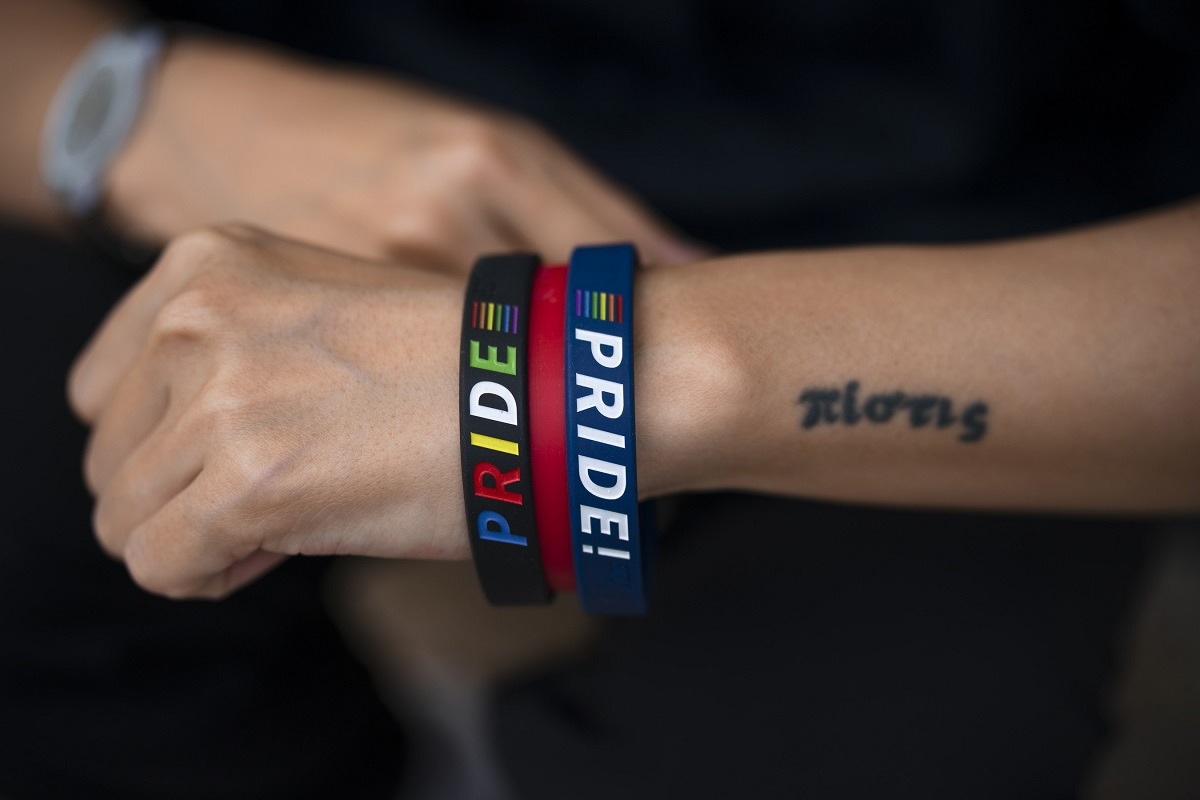
Pride-themed accessories worn by Yang.
12:13 JST, July 4, 2023
SEOUL – Thousands of revelers gathered Saturday for the South Korean capital’s Pride celebration, waving rainbow banners and parading through the streets despite the sultry monsoon heat, energized by the city’s decision to deny the event a permit for the use of a prominent plaza.
The lively mood was in stark contrast to the relatively muted presence of conservative protesters, who in years past have surrounded the plaza near City Hall, casting a shadow over the Pride celebrations with homophobic slogans blaring through loudspeakers. This year, parade-goers cheekily chanted their slogans back at them while drag queens and DJs partied atop floats.
Holic Sunwoo Yang, chair of the Seoul Queer Culture Festival’s organizing committee, anticipated deliberations over this year’s permit. But she didn’t think it would go as far as a rejection, with the venue instead handed over to a conservative Christian group looking to host a youth concert.
“The initial reaction was shock,” Yang said. “But our baseline mind-set was that we will host the parade anywhere we can, regardless of blockages.”
And so they did, getting permission to move the event into the Euljiro neighborhood of downtown Seoul, where drag queen Manura strutted past booths handing out Pride-themed fans. “Bloom, Queer Nation!” they shouted, the theme of this year’s event, which the organizers said was attended by 150,000 people.
The Seoul festivities were among those held around the world to mark Pride Month throughout June, looking back on a year in which several countries passed legislation affecting the lives of LGBTQ+ people. Some expanded rights for the community; Taiwan granted same-sex couples adoption rights in May. The United States, on the other hand, had a historic surge in bills targeting transgender rights.
In socially conservative South Korea, homosexuality remains taboo, and same-sex unions are not legally recognized. In a recent Pew Research Center survey, 59 percent of South Koreans said they opposed same-sex marriage – the second-highest rate of opposition among Group of 20 countries surveyed, behind Indonesia. A bill seeking anti-discrimination protections for LGBTQ+ people has failed to gain traction here.
A spokesperson for the Christian Television System, a South Korean religious broadcaster that regularly airs anti-LGBTQ+ content, denied allegations that it had planned the concert for the same day to stop the Pride festival. Seoul’s conservative mayor, Oh Se-hoon, has expressed opposition to homosexuality, saying he “cannot approve” of it. The mayor’s office declined an interview request, citing scheduling conflicts.
Na-Young Lee, who teaches sociology at Chung-Ang University and specializes in women’s rights, said while the visibility that comes with LGBTQ+ people occupying a public space has led to repression from authorities, “the pushback is not entirely a negative thing in that it validates their existence.”
“The media begin to pay closer attention, and it provides activists an opportunity to reassess the direction of their messaging,” she said. “We see that this dynamic created by suppression and resistance has, in a way, played a role in continuing to further advance LGBT rights.”
Here are some voices from Pride in Seoul: some deeply involved in the celebrations, some whose contributions took other forms, each one a part of the city’s multifaceted LGBTQ+ community.
JiGook
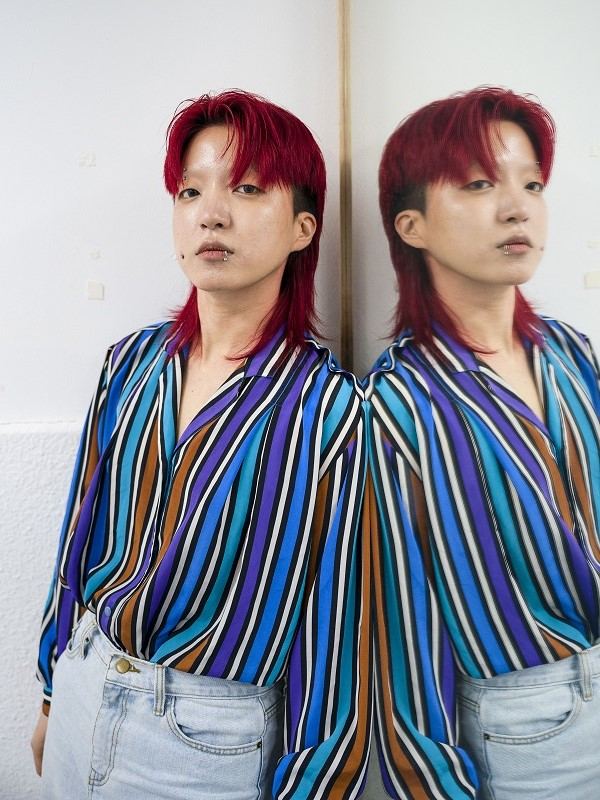
Singer-songwriter JiGook
The first time JiGook performed drag, the singer-songwriter from Jeju island donned a wig and a shimmery silver top: A “bromance punk” sort of concept, he said.
Growing up, JiGook – who spoke on the condition that he be identified by his chosen name – “hated the feeling of being perceived as a female.”
After years of constant misgendering, in 2020, he made the “difficult decision” to start hormonal therapy.
“My voice started to change, and I couldn’t control it when I sang,” JiGook said. “I almost let go of everything, but I was able to find the will to continue pursuing music after launching QI.X,” he said, referring to his queer idol group, which featured in this year’s Pride festival.
Drag is still a key component of JiGook’s oeuvre; a recent outfit was inspired by a tangerine from Jeju. “I grew up eating tangerines and so I said, ‘Why not become one?'” he said. “Why not become something that I love?”
Kwon Bada
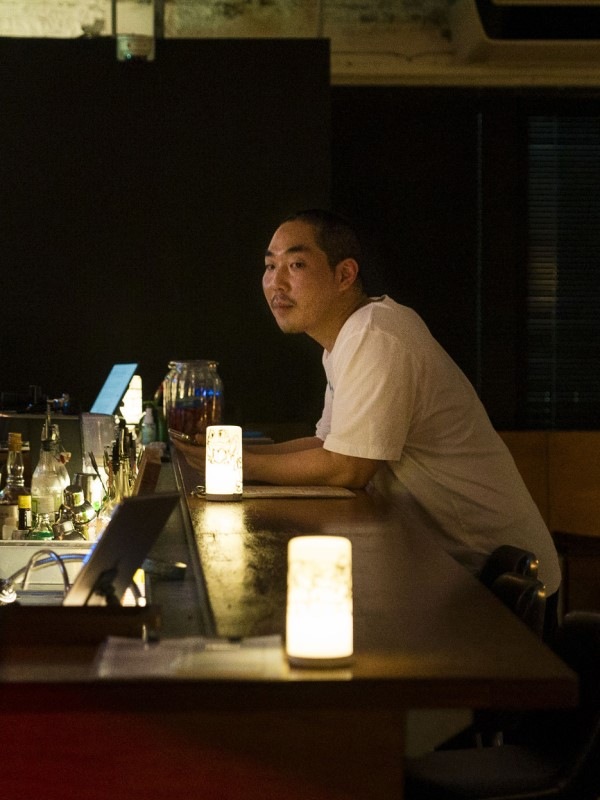
Bar owner Kwon Bada
At the end of 2021, when covid restrictions were still casting a haze over Seoul’s nightlife, Kwon Bada opened what he describes as a “straight-friendly gay bar.”
The bar – called Kockiri, the Korean word for “elephant,” deployed as a pun – was born from Kwon’s taste in music, inspired by the queer underground house and disco scenes of the late 20th century.
Kockiri quickly became a fixture of the city’s gay nightlife scene, with gay people bringing their straight friends and lesbian patrons thanking him for creating such a space.
In June, the bar hosted a “Marriage For All Party,” where the house music paused as the lawmaker who introduced South Korea’s first same-sex marriage bill gave a speech.
Kwon said that while his role may not be that of an activist, he contributes by providing community and boosting others: “I do what I can do.”
Holic Sunwoo Yang
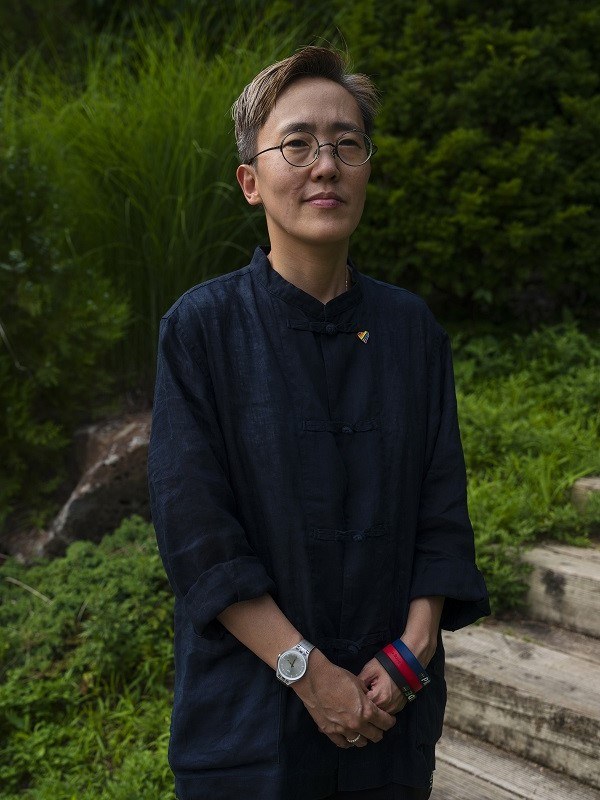
Holic Sunwoo Yang
As an organizer of the Pride festival’s various iterations since 2008, Yang has long had a front-row seat to the protesters. Their religious slogans are all too familiar to her.
The lesbian daughter of a Christian mother, Yang, 46, said she was exposed to such sentiments growing up in Seoul, but she does not believe they are representative of her faith.
“I was Christian before I realized my sexual orientation and was told that I’d go to hell,” she said.
“If God returns to Earth, would he have acted like that?” Yang said she asked herself. “When I look at the image of the Christian groups rallying against sexual minorities and excluding them, I think not.”
Which is why, Yang said, it is vital that the festival remained at the center of Seoul – a reminder that “we exist in this space with you, are living, working and loving alongside you.”
Jungle
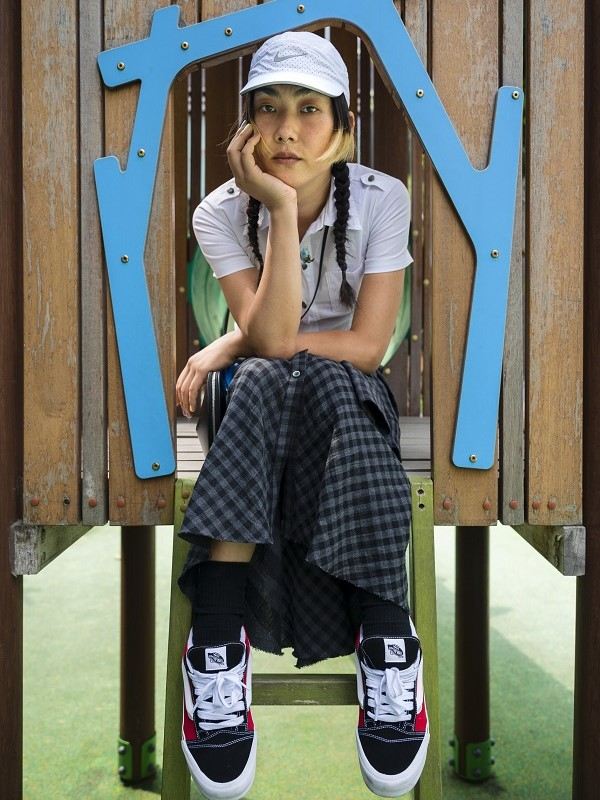
Jungle, a longtime Seoul resident
Growing up in Busan, on the southern tip of the Korean Peninsula, Jungle always knew she was different. “I knew about who I was – who I am – at a very young age,” she said.
Jungle, a transgender woman who goes by that mononym, decided to transition when she was 20, only to stop at the behest of her family. Now 40, the longtime Seoul resident restarted her transition two years ago. “The moment I opened myself up to the world, the world also opened up to me,” she said.
The relative safety she experiences in South Korea, she said, comes from the lack of visibility for transgender people, and more broadly the LGBTQ+ community, without its own Stonewall moment.
Now, she said, “we’re in a time where things are surfacing,” such as a landmark ruling this year by a South Korean court ordering the national health insurer to provide spousal coverage for gay couples. “We’re in a very important moment.”
Cha Hae-young
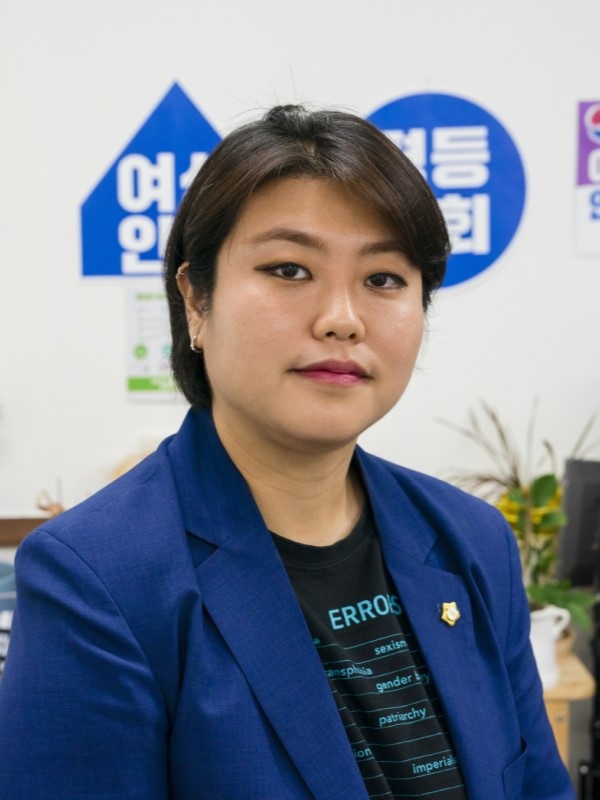
Cha Hae-young
Cha Hae-young is South Korea’s first openly LGBTQ+ elected official, but that is not how they want to be introduced.
“My identities as a queer person and a politician coexist, but when put together, it feels like people only see me for my queerness,” the 36-year-old said. “I want people to recognize me for my work.”
Cha, who has been at the forefront of community-building in Seoul’s Mapo district since their historic win, said they wrestle with pressure to constantly prove themselves.
The anniversary of their election win was the same day as the Pride festival – so they attended only toward the end, after wrapping up their official duties.
“Right now, my identity as a council member comes first,” Cha said. “My residents chose me when they elected me. And if I do the work now, I know that I can at least serve as a sounding board for other sexual minorities who run for office next.”
Top Articles in News Services
-

Survey Shows False Election Info Perceived as True
-

Hong Kong Ex-Publisher Jimmy Lai’s Sentence Raises International Outcry as China Defends It
-

Japan’s Nikkei Stock Average Touches 58,000 as Yen, Jgbs Rally on Election Fallout (UPDATE 1)
-

Japan’s Nikkei Stock Average Falls as US-Iran Tensions Unsettle Investors (UPDATE 1)
-

Trump Names Former Federal Reserve Governor Warsh as the Next Fed Chair, Replacing Powell
JN ACCESS RANKING
-

Producer Behind Pop Group XG Arrested for Cocaine Possession
-

Japan PM Takaichi’s Cabinet Resigns en Masse
-

Man Infected with Measles Reportedly Dined at Restaurant in Tokyo Station
-

Israeli Ambassador to Japan Speaks about Japan’s Role in the Reconstruction of Gaza
-

Videos Plagiarized, Reposted with False Subtitles Claiming ‘Ryukyu Belongs to China’; Anti-China False Information Also Posted in Japan



























